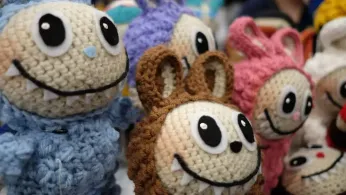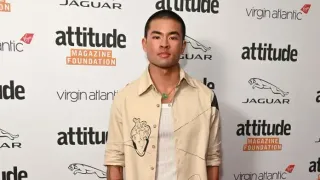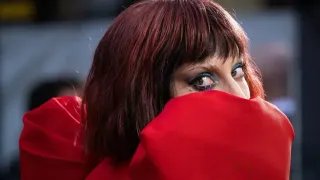
5 hours ago
Labubu Leaps to the Big Screen: Sony’s Latest Move Sparks Queer Joy and Pop Culture Buzz
READ TIME: 4 MIN.
Once a cult favorite among art toy collectors, Labubu has exploded from Hong Kong’s creative underbelly onto the world stage, thanks to a viral cocktail of celebrity sightings, TikTok trends, and now—Hollywood’s ever-watchful gaze. With Sony Pictures snapping up the screen rights and plotting a feature film (and maybe a whole franchise), Labubu’s leap to the big screen isn’t just another toy-to-movie cash-in. For many in the LGBTQ+ community, it’s a thrilling affirmation of how our favorite offbeat, oddball icons can become pop royalty—on our terms, and with our flair.
Labubu is the brainchild of Hong Kong-born, Europe-based artist Kasing Lung, who first introduced the snaggle-toothed, punky monster in a 2015 picture book. What began as a loving, slightly mischievous character study soon grew into a designer toy line, thanks to a partnership with Chinese collectibles powerhouse Pop Mart in 2019. The real twist? Labubu and friends—like Zimomo, Mokoko, and boyfriend Tycoco—are distributed in “blind boxes,” making each unboxing a heart-pounding mystery and transforming everyday fans into excited (and sometimes obsessed) collectors .
Labubu’s “ugly-cute” vibe—chaotic hair, bug eyes, and a wicked little grin—has always been a wink to the outsiders, the misfits, the ones who find beauty in the unexpected. It’s no surprise, then, that queer fans have embraced Labubu with open arms and rainbow hashtags. The dolls’ playful ambiguity and refusal to fit any one mold is a mood many LGBTQ+ folks know well—and celebrate fiercely.
Labubu’s biggest pop culture moment arrived in April 2024, when BLACKPINK’s Lisa was spotted with a Labubu keychain. The image rocketed across social media, quickly followed by the likes of Rihanna, Kim Kardashian, and David Beckham joining the trend . Almost overnight, Labubu went from quirky collector’s item to must-have accessory, sparking international demand and sending Pop Mart’s profits soaring by 350 percent in just a few months .
On TikTok, Labubu “unboxing” videos became a viral rite of passage, while fans—many queer, many joyfully expressive—shared their latest finds, swapped stories of elusive secret editions, and even documented the dramatic store lines and resale frenzies. In a world that often feels manufactured for mainstream tastes, Labubu’s popularity is a testament to how queer and alternative aesthetics can drive the pulse of global pop culture .
Sony’s move to bring Labubu to cinemas is the latest chapter in Hollywood’s wild love affair with toys—but this isn’t just a rinse-and-repeat of Barbie’s billion-dollar pink parade or Lego’s plastic punchlines. The difference? Labubu arrives with a built-in fandom that’s diverse, fiercely creative, and not afraid to remix nostalgia with a dose of queer camp and internet wit .
“Labubu cinema is real. Sony Pictures has acquired screen rights to the Chinese brand and has set its sights on developing a feature film, and potentially a franchise, based on the ubiquitous and very trendy dolls that became a pop culture fixation over the past year,” wrote J. Kim Murphy in Variety .
For LGBTQ+ audiences, Labubu’s cinematic ascent is more than fodder for meme-makers and merch drops. It’s a cultural moment that echoes the community’s love for underdog icons—from The Muppets to Sailor Moon, from David Bowie’s Ziggy Stardust to the genderfluid glam of Janelle Monáe. When outsiders become the main event, queer folks are often the first to cheer.
What makes Labubu’s story so resonant within queer culture is the character’s spirit of playful rebellion and chosen family. In the Labubu universe, every monster gets a place at the table: Zimomo leads, Mokoko brings the vibes, Tycoco offers romance, and Labubu? They’re the wild card, the one who never colors within the lines .
The blind box phenomenon—never knowing which character you’ll get, but joining a global community that celebrates every reveal—mirrors the LGBTQ+ journey of self-discovery and chosen kinship. For many, collecting Labubu isn’t just about the toys; it’s about belonging, about finding joy in shared quirks, and about supporting one another through the highs and lows of fandom.
As Hollywood ponders whether the Labubu film will be animated, live-action, or something entirely new, fans are already envisioning the possibilities: a story that centers difference, celebrates friendship, and maybe—just maybe—makes space for all of us who grew up feeling a little bit “ugly-cute” ourselves .
Sony’s Labubu project is still in its earliest days, with no director or cast attached, and the creative direction—live-action or animation—yet to be announced . But if the recent success of Barbie (over $1.4 billion at the box office) and The Lego Movie are any guide, the studio is betting on Labubu’s fandom to bring the same kind of magic—and maybe a few new, glittering twists .
For queer moviegoers, the anticipation is about more than box office numbers. It’s about seeing ourselves, our humor, our weirdness, and our communities reflected—maybe for the first time—in the world of mainstream collectibles gone cinematic. As Labubu prepares to trade blind boxes for the bright lights of Hollywood, one thing is clear: sometimes, the monsters we love most are the ones who teach us how to shine.






